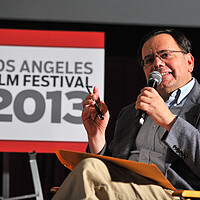The Candy Man can: ‘Wonka’ is scrumpdiddlyumptious
Loading...
“Wonka,” the latest movie musical version of Roald Dahl’s classic 1964 children’s book, “Charlie and the Chocolate Factory,” is also the cheeriest and most heartfelt. These are not qualities typically associated with the source material, which often dips into darkness and the macabre. Neither are they prominent in the beloved 1971 Gene Wilder movie, “Willy Wonka & the Chocolate Factory,” or the less-than-beloved 2005 Tim Burton rendition starring Johnny Depp.
Instead, what we have in the new film, starring Timothée Chalamet, is something closer in tone to “Paddington 2.” This is not surprising, since the same director, Paul King, and his co-writer, Simon Farnaby, were responsible for that one.
I didn’t experience this tonal makeover as a deficiency, certainly not when the results are as entertaining as they are here. I kept waiting for the film to get ghoulish. When it didn’t, I was more relieved than exasperated. King understands that children’s tales are necessarily often filled with frights, and those elements are not discounted here. Doing so would have belittled the intelligence of audiences of all ages. But King is above all a pleasure-giver. He wants to heighten the knockabout joys of unfettered high spirits.
Why We Wrote This
Is there more to know about Willy Wonka? The cheery prequel “Wonka” imagines the origin story of Roald Dahl’s chocolatier while celebrating “the knockabout joys of unfettered high spirits,” our critic says.
His film, which draws on Dahl’s characters but is mostly freshly conceived, is a kind of prequel to the later movie versions. It’s an origin story. Chalamet’s Willy is a sweet-souled idealist with, as he sings, “a hatful of dreams.” He doesn’t presage Wilder’s bad-tempered eccentricity or Depp’s dourness. But so what? Taken on its own terms, Chalamet’s portrayal works. He may be a shade too dewy-eyed for the role, and his song and dance skills are not the highest, but he’s a trouper. (Neil Hannon’s songs are serviceable without being particularly hummable.)
As insurance, King surrounds Chalamet with a full cast of skilled cut-ups and master caricaturists. They include Hugh Grant as a curmudgeonly 12-inch-tall Oompa Loompa, with orange skin and green hair, and Rowan Atkinson, as a flibbertigibbet priest. There’s a palpable delight in their embrace of the grand-scale silliness that is so integral to the British theatrical tradition.
Olivia Colman’s flagrantly villainous Mrs. Scrubbit along with co-conspirator Bleacher (Tom Davis) arrive early on the scene. Without much money, Willy has sailed into what looks to be a stylized, early-20th-century London, where he desires to set up shop in the tony town square as a master chocolatier.
Mrs. Scrubbit is the proprietor of the rooming house where he boards. Because Willy is illiterate, he signs a contract without realizing it makes him an indentured servant in the basement laundry room along with a host of other captives. (My favorite of this lot is Abacus Crunch, a good-natured accountant played by Jim Carter from “Downton Abbey.”) He bonds with Noodle (Calah Lane), an orphan girl. Together they devise ways to periodically escape and display his chocolate marvels, some of which hover in midair, to the outside world. These displays are like a whirling, phantasmagoric demonstration of how unconditionally happy, how blissfully childlike, savory sweets can make us feel.
Inevitably all this tumult attracts the attention of a trio of huffy rival confectioners, Slugworth (Paterson Joseph), Prodnose (Matt Lucas), and Fickelgruber (Mathew Baynton). They plot against him with an assist from the corrupt chief of police (Keegan-Michael Key), whose covert love of Willy’s chocolates explains his ever-expanding girth.
This all comes across with a pronounced playfulness. It’s Dickensian-lite. Where the film shows its heart is in the way Willy longs for his late mother (Sally Hawkins). King knows how to convey Willy’s sense of loss without getting all gloppy. Willy’s mother instilled in him a love for companionship as well as for chocolate. He finds a family in his new world, and in his magical concoctions, he also realizes the truism his mother wished to impart: The secret is not the chocolate but the people you share it with.
Peter Rainer is the Monitor’s film critic. “Wonka” is rated PG for some violence, mild language, and thematic elements.









